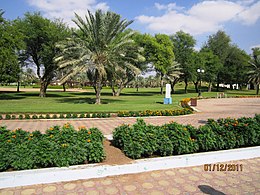Hili Archaeological Park
| UNESCO World Heritage Site | |
|---|---|
 Park | |
| Location | Al Ain, Emirate of Abu Dhabi, United Arab Emirates |
| Part of | Cultural Sites of Al Ain (Hafit, Hili, Bidaa Bint Saud and Oases Areas) |
| Includes |
|
| Criteria | Cultural: (iii), (iv), (v) |
| Reference | 1343 |
| Inscription | 2011 (35th Session) |
| Coordinates | 24°17′34.38″N 55°47′23.69″E / 24.2928833°N 55.7899139°E |
Hili Archaeological Park (Arabic: حَدِيْقَة آثَار ٱلْهِيْلِي, romanized: Ḥadīqat Āthar Al-Hīlī) is the location of a Bronze Age site in Al Ain, Emirate of Abu Dhabi, the United Arab Emirates.[1]
Description and history
[edit]Hili is the largest Bronze Age site in the UAE and dates from the 3rd millennium BCE. Other remains include settlements, tombs, and a falaj dating from the Iron Age. Some of the site is located outside the park in a protected area. Finds from the site can be seen in the Al Ain National Museum in central Al Ain. The Hili Grand Tomb is a tower measuring 12 m (39 ft) in diameter that has been reconstructed.[2] The tombs belong to the Umm al-Nar culture.

In May 2019 the Abu Dhabi Department of Culture & Tourism reported that fingerprints about 3000 years old were found at Hili II. They apparently belonged to craftsmen who constructed a wall at the site.[3][4][5]
See also
[edit]- Al Ain Oasis
- Tawam (region)
- Archaeological Sites of Bat, Al-Khutm and Al-Ayn
- Hafit period
- Ibri
- List of Ancient Settlements in the UAE
- Qattara Oasis
- Rumailah, UAE
References
[edit]- ^ "Al Hilli Archaeological Park", Abu Dhabi Authority for Culture & Heritage, The USA, archived from the original on 2011-07-22, retrieved 2010-10-03
- ^ "Hili Grand Tomb", Al Ain National Museum, The UAE, archived from the original on 2009-12-03, retrieved 2010-10-03
- ^ "New archaeological evidence unveiled in Al Ain". Abu Dhabi World. 2019-05-29. Retrieved 2019-05-30.
- ^ "3,000-year-old fingerprints found at Al Ain's World Heritage Site". Abu Dhabi: Gulf News. 2019-05-29. Retrieved 2019-05-30.
- ^ Dennehy, John (2019-05-29). "3,000-year-old fingerprints found at ancient village in Al Ain". The National. Retrieved 2019-05-30.

